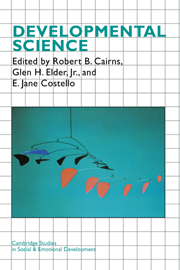Book contents
- Frontmatter
- Contents
- List of Contributors
- Foreword
- Acknowledgments
- Developmental Science:A Collaborative Statement
- 2 Developmental Science: Toward a Unified Framework
- 3 Human Lives in Changing Societies: Life Course and Developmental Insights
- 4 Developmental Psychobiological Theory
- 5 The Question of Continuity and Change in Development
- 6 Primates and Persons: A Comparative Developmental Understanding of Social Organization
- 7 Cognitive Development
- 8 Early Social-Communicative Development: Illustrative Developmental Analyses
- 9 Developmental Psychopathology
- 10 Culture and Cognition in Developmental Perspective
- 11 The Making of Developmental Science
- References
- Author Index
- Subject Index
Foreword
Published online by Cambridge University Press: 09 November 2009
- Frontmatter
- Contents
- List of Contributors
- Foreword
- Acknowledgments
- Developmental Science:A Collaborative Statement
- 2 Developmental Science: Toward a Unified Framework
- 3 Human Lives in Changing Societies: Life Course and Developmental Insights
- 4 Developmental Psychobiological Theory
- 5 The Question of Continuity and Change in Development
- 6 Primates and Persons: A Comparative Developmental Understanding of Social Organization
- 7 Cognitive Development
- 8 Early Social-Communicative Development: Illustrative Developmental Analyses
- 9 Developmental Psychopathology
- 10 Culture and Cognition in Developmental Perspective
- 11 The Making of Developmental Science
- References
- Author Index
- Subject Index
Summary
Seldom, in reading a scientific manuscript, does one feel impelled to identify it as a potential scientific milestone. In this instance, the milestone may well mark a significant step toward the evolution of a new and more powerful paradigm for the scientific study of human development. To be sure, as the authors of the volume emphasize, any new “paradigm shift” (if such a phenomenon, in fact, will ever exist) still lies far ahead. Nor do the authors claim principal credit for having themselves achieved the progress that has been made. Rather, they call attention to what they have perceived as an emergent convergence and isomorphism, mostly over the past two decades, in the work of scientists in different disciplines, employing seemingly different theoretical perspectives, reporting results specific to delimited substantive domains, and yet, in the authors' view, all producing patterns of findings encompassable within the same general model of developmental structure and process. Moreover, the defining properties of the emergent model contradict, almost point for point, the now prevailing conceptual and operational strategies of choice in each specialized field of inquiry.
- Type
- Chapter
- Information
- Developmental Science , pp. ix - xviiiPublisher: Cambridge University PressPrint publication year: 1996
- 18
- Cited by

